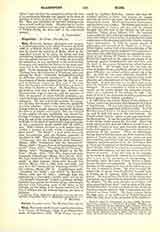

Klee, HEINRICH, German theologian and exegete, b. at Munstermaifeld, in the Rhine Province, April 20, 1800; d. at Munich, July 28, 1840. At the age of seventeen he entered the seminary of Mainz, where he distinguished himself by his piety, his talent, and that unremitting application to study which characterized him throughout his later life. In 1824, the year after his ordination, he was appointed to the professorship of exegesis and ecclesiastical history in the same semi-nary, and in the following year also to that of philosophy. In the meantime he obtained the Doctorate of Theology from the University of Wurzburg, after presenting the thesis “Tentamen theologico-historicum de chiliasmo primorum saeculorum” In 1829 the Government of Baden tendered him the chair of exegesis at Freiburg, vacated by Hug, and at the same time the Prussian authorities offered him a professor-ship either at Breslau or Bonn. He chose Bonn; but his position there was a difficult one. Hermes and Hermesianism reigned supreme, and the presence of Klee, an exponent of sound Catholic principles, was viewed with unconcealed disfavor by his Rationalistic colleagues. His tact and genial manners, his attractive lectures and learned works, however, gradually won him influence. After a ten years’ stay at Bonn, during which he taught dogmatic and moral theology the history of dogma and exegesis, Klee was induced by the conflict between Archbishop von Droste-Vischering of Cologne and the Hermesian professors to accept the call to the University of Munich as successor to Mohler in the chair of dogmatic theology and exegesis, but a premature death carried him off within a year. Klee’s intense devotion to work enabled him to publish a number of works within a comparatively short period. “Die Beicht”, a work which shows his close acquaintance with the Fathers, appeared at Frankfurt in 1827. Then followed in rapid succession: “Commentar uber das Evangelium nach Johannes” (Mainz, 1829); “Commentar uber den Romerbrief” (Mainz, 1830); “Kurzes System der katholischen Dogmatik” (Bonn, 1831); “Encyclopadie der Theologie” (Mainz, 1832); “Auslegung des Briefes an die Hebraer” (Mainz, 1833); “Die Ehe, dogmatisch-archaologische Abhandlung” (Mainz, 1833; 2nd ed., 1835). His most important work is the “Katholische Dogmatik” in three volumes, which went through four editions (Mainz, 1834-5, 1840, 1844, and 1861), and next to it the “Lehrbuch der Dogmengeschichte” in two volumes (Mainz, 1837-8). A posthumous work, “Grundriss der Ethik”, was edited by Himioben (Mainz, 1843, 2nd ed., 1847). Although Klee was animated by a thoroughly Catholic spirit, and by his “Katholische Dogmatik” helped to promote sounder Catholic ideas among the German clergy, then largely infected with Liberalism, some of his views, as, for instance, on the origin of the human soul and on the fate of children who die without baptism, are open to criticism.
F. BECHTEL,

